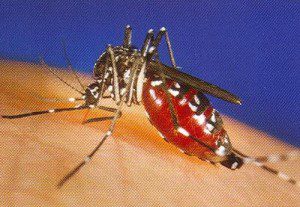The Florida Department of Health (DOH) announced Monday there are 21 confirmed cases, both local and imported, of mosquito-borne illness.
The numbers serve as an important reminder for Florida’s residents and visitors to protect themselves against the West Nile virus (WMV) and Dengue Fever, DOH said.
In 2011, 8 cases of West Nile were confirmed in Duval County; 1 case each of Dengue Fever in Miami-Dade and Martin County and 11 cases of imported Dengue Fever statewide (2 – Broward County, 1 – Hendry County, 1 – Marion, 1 – Martin County, 4 – Miami-Dade County, 1 – Pasco County and 1 – Pinellas County.)
“While the chance of humans contracting West Nile virus and Dengue Fever is low, we still need to take precautions against mosquito-borne illness,” said Carina Blackmore DVM, PhD. Dipl. ACVPM, State Public Health Veterinarian. “These precautions are important to limit the spread of mosquito-borne diseases to humans.”
About one in 150 people infected with WNV will develop severe illness. Symptoms can include high fever, headache, neck stiffness, stupor, disorientation, coma, tremors, convulsions, muscle weakness, vision loss, numbness and paralysis. These symptoms may last several weeks, and neurological effects may be permanent. The state monitors animals as sentinels for WNV, to determine if any of the viruses are present in the community.
Dengue viruses do not have animal hosts but spread between humans and mosquitoes. Common symptoms of disease include headache, fever, muscle and joint pains, nausea and vomiting, and rash.
There is no vaccine for preventing WNV disease or Dengue Fever. The best defense against mosquito-borne illness is prevention. The most effective measure for residents is to avoid mosquito bites by using repellents or staying behind screened windows and doors when mosquitoes are active.
To prevent mosquitoes from living and multiplying around your home or business:
DRAIN standing water:
-Drain water from garbage cans, buckets, pool covers, coolers, toys, flowerpots or any other containers where water has collected.
-Discard old tires, drums, bottles, cans, pots and pans, broken appliances and other items that aren’t being used.
-Empty and clean birdbaths and pet’s water bowls at least once or twice a week.
-Protect boats and vehicles from rain with tarps that don’t accumulate water.
-Maintain swimming pools in good condition and appropriately chlorinated. Empty plastic swimming pools when not in use.
COVER your skin with:
-CLOTHING – If you must be outside when mosquitoes are active, cover up. Wear shoes, socks, long pants and long sleeves.
-REPELLENT – Apply mosquito repellent to bare skin and clothing. Always use repellents according to the label’s instructions. Repellents with 10-30% DEET, picaridin, oil of lemon eucalyptus, and IR3535 are effective.
-Use mosquito netting to protect children younger than 2 months old.
COVER doors and windows with screens:
-Keep mosquitoes out of your house. Repair broken screening on windows, doors, porches, and patios.
For more information visit DOH’s Bureau of Environmental Public Health Medicine’s Web site at http://www.doh.state.fl.us/Environment/medicine/arboviral/Prevention.html.
Information on how to reduce your risk while visiting areas with Dengue Fever can be found on the Centers for Disease Control and Prevention’s website at http://www.cdc.gov/dengue/travelOutbreaks/index.html.



